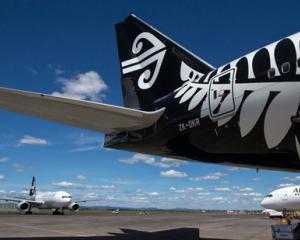The company announced normalised earnings before taxation of $33 million for the six months ended December 31, down 71% on the previous corresponding period.
Normalised earnings exclude net gains or losses on derivatives that hedge exposures in other financial periods. That could include fuel and currency exposure.
Reported profit was $38 million.
Air New Zealand also announced it would cut 441 jobs before the end of the June financial year. A total of 266 of those roles would go through non-replacement of roles or non-renewal of contracts - 193 of those jobs had already gone. The removal of the remaining 175 jobs would come from redundancies.
Chief executive Rob Fyfe said consultation with affected staff began yesterday morning.
Air New Zealand joins a list of airlines to announce downgraded profits and staff cuts so far this year. The Otago Daily Times has already reported on American Airlines operating in bankruptcy and planning to slash 13,000 jobs, British Airways planning to cut 5800 staff, Qantas to cut 500 staff and stop its Auckland to Los Angeles flights and a smaller airline, Air Australia, going into voluntary administration last week.
Mr Fyfe said the company acknowledged the "disappointing result" and had started a series of initiatives to improve the airline's profitability by more than $185 million a year by 2015 through a combination of cost reduction, improved efficiencies and revenue growth.
"The price of jet fuel has doubled over the last three years but a weak global economy is hindering our ability to pass on these higher costs to passengers.
We have been moving quickly to adapt to gain greater efficiencies and to develop into a stronger, more profitable business."
Mr Fyfe said the airline had worked hard to improve its competitive position, with several things already delivering towards the airline's target of improved future profitability.
Craigs Investment Partners broker Peter McIntyre said the result was not one Mr Fyfe would welcome, having already announced he was leaving the airline some time this year.
"Mr Fyfe would want to leave the airline in a better position than when he started, but that doesn't look likely at this stage."
The result was disappointing for investors because it was well down on Craigs' forecasts, Mr McIntyre said. The share price had fallen 4.5% by late afternoon and was likely to fall further.
Although Air New Zealand had net cash reserves of $912 million, it would "burn" through that in the current environment.
Air New Zealand was performing well on domestic routes, but the long-haul operation had become a struggle, he said.
The European and Japanese markets had weakened significantly and the airline was struggling to control costs. Fuel costs were out of its control.
In tight times, consumers turned to low-cost carriers which had also hurt Air New Zealand, Mr McIntyre said.
"From a pricing perspective, it is hard for Air New Zealand to push up its prices when competing with airlines that are here one day and gone the next. If New Zealanders would pay a bit more for their seats, they would have a far more viable airline. But that's not the way the market is going," he said.
The Government is the majority owner of Air New Zealand and Prime Minister John Key has already announced the Government plans to reduce its shareholding in the national carrier from about 80% to 51%.
Labour Party SOE spokesman Clayton Cosgrove said there was no good time to sell a state asset such as Air New Zealand, but there could not be a worse time than when it had just announced a substantial fall in profitability.
"The overwhelming majority of Kiwis are saying that no time is a good time to sell off our prized assets because once they're sold, we'll never get them back again.
"But in the case of Air New Zealand, which has just announced that its profits have fallen 70%, you couldn't pick a worse time."
Mr Fyfe warned the trading environment for Air New Zealand remained uncertain and fuel prices had remained high.
"Given the 2012 financial year performance to date and the global economic environment, achieving last year's result will be a challenge."





